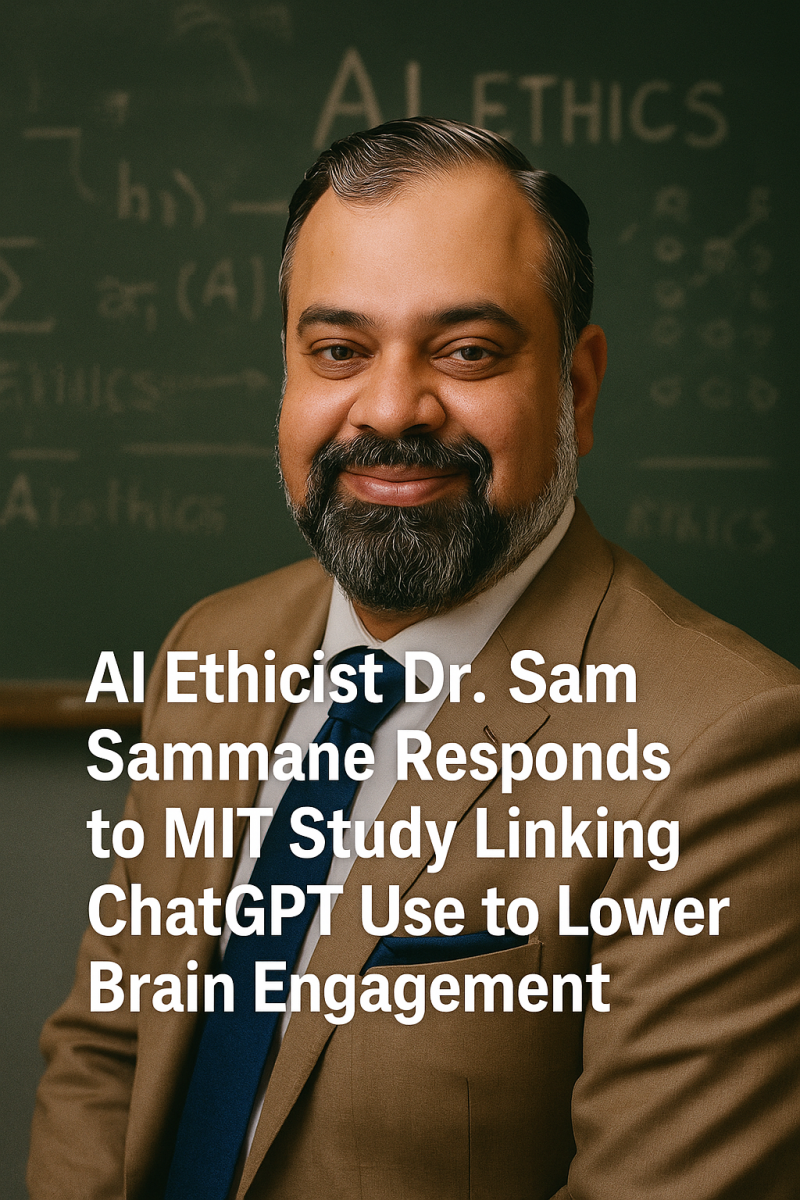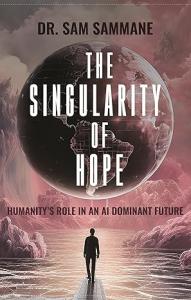
AI Ethicist Dr. Sam Sammane Responds to MIT Study Linking ChatGPT Use to Lower Brain Engagement
AI ethicist Sam Sammane responds to MIT study linking ChatGPT to lower brain activity, urging a deeper look at human behavior and overdependence on AI tools.
ANAHEIM, CA, UNITED STATES, June 23, 2025 /EINPresswire.com/ -- A recent study from MIT’s Media Lab has reignited the conversation around the cognitive effects of generative AI tools.
The research, which tracked participants’ brain activity while writing essays using ChatGPT, traditional internet search, or no tools at all, suggests that frequent reliance on language models may reduce neural engagement and hinder critical thinking.
As educators, technologists, and policymakers weigh the findings, one voice is urging a more measured interpretation. Dr. Sam Sammane, AI ethicist and author of "The Singularity of Hope: Humanity's Role in an AI-Dominated Future," says the issue lies not with the tool itself—but with how humans are choosing to use it.
MIT Research Sparks New Debate on Generative AI and Learning
The MIT study, which has not yet been peer-reviewed, evaluated 54 participants aged 18 to 39. Each group was asked to write SAT-style essays under different conditions: using ChatGPT, using Google Search, or writing without assistance. Researchers used EEG monitoring to assess brain activity across multiple regions.
The study’s early conclusions point to a concerning trend: participants using ChatGPT exhibited lower cognitive engagement, especially over time. The researchers observed that many users gradually began to delegate more of the task to the AI tool, often copy-pasting entire outputs with minimal revision.
Meanwhile, participants in the “brain-only” group showed higher activity in regions associated with memory, ideation, and attention.
Lead researcher Nataliya Kosmyna has expressed concerns about widespread adoption of AI tools in education without adequate oversight, particularly for young users whose cognitive processes are still developing.
Sammane: “We’ve Always Had Tools. What’s Changed Is Our Readiness to Surrender to Them.”
Sam Sammane says the findings of the MIT study raise timely ethical and behavioral questions that align with the themes explored in his award-winning and best-selling 2024 book, The Singularity of Hope. The book addresses the intersection of AI, ethics, and human agency, arguing that the long-term effects of new technologies will be shaped more by cultural behaviors than by the tools themselves.
“We’ve always had tools,” Sammane said. “What’s changed is our readiness to surrender to them entirely.”
According to Sammane, generative AI has enormous potential—but like any technology, its benefits depend on the intention and discipline of the user. He warns that unchecked reliance on such systems could lead to intellectual complacency.
“AI should extend our thinking, not replace it,” he said. “When we give it our judgment, we give away something far deeper than productivity.”
A Call for Responsible Adoption, Not Reaction
While the MIT research cautions against premature integration of AI into classroom settings, Sammane emphasizes the importance of distinguishing between fear and foresight. He believes the current moment calls for thoughtful public discussion, not blanket rejection.
“The danger isn’t the existence of AI in schools—it’s uncritical adoption without first asking what kind of thinking we want to preserve,” he said.
This view parallels a growing consensus among ethicists who argue that technologies like ChatGPT should be evaluated not just on performance, but on how they shape the cognitive habits of their users over time.
From Augmentation to Automation: What’s at Stake?
A recurring theme in The Singularity of Hope is the line between augmentation—where AI supports human capacity—and automation, where it begins to replace it. Sammane’s analysis suggests that when users default to AI tools without reflection, they risk bypassing the very mental processes that build creativity, memory, and resilience.
“Efficiency is not the same as understanding,” he said. “When we allow the machine to do the thinking, we miss the opportunity to struggle through ideas, to learn, and to grow.”
In the context of the MIT study, this distinction may explain why participants who relied on ChatGPT remembered less about their essays and demonstrated lower neural connectivity when asked to revise them without assistance.
Looking Ahead: Human Use Will Shape Human Outcomes
As discussions around the role of AI in education and work continue, Sammane encourages institutions to invest not just in AI tools, but in frameworks that promote conscious, intentional use. He notes that while AI will continue to evolve, the questions surrounding it remain deeply human.
“We should not be afraid of the tool,” he said. “But we should be very afraid of forgetting how to think without it.”
Read more about the MIT study at: https://arxiv.org/abs/2506.08872
About Sam Sammane
Sam Sammane is a technology entrepreneur, AI ethicist, and author of The Singularity of Hope. His work explores the philosophical, ethical, and spiritual dimensions of artificial intelligence and its impact on the future of human agency.
Sammane is also the author of Republic of Mars, his debut science fiction novel exploring themes of power, identity, and truth in a future Martian colony. For commentary, interviews, or additional insights, Sam Sammane can be reached via his official website or social media channels.
Sam Sammane
TheoSym
email us here
Visit us on social media:
LinkedIn
Instagram
Facebook
YouTube
TikTok
X
Distribution channels: Book Publishing Industry, Culture, Society & Lifestyle, Education, Media, Advertising & PR, Technology
Legal Disclaimer:
EIN Presswire provides this news content "as is" without warranty of any kind. We do not accept any responsibility or liability for the accuracy, content, images, videos, licenses, completeness, legality, or reliability of the information contained in this article. If you have any complaints or copyright issues related to this article, kindly contact the author above.
Submit your press release


